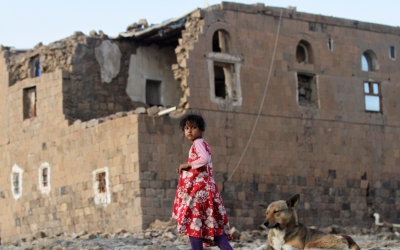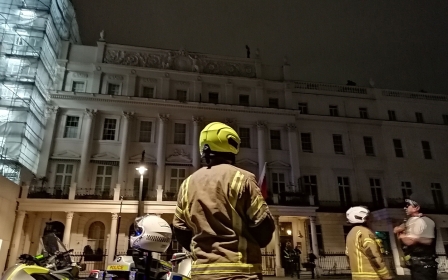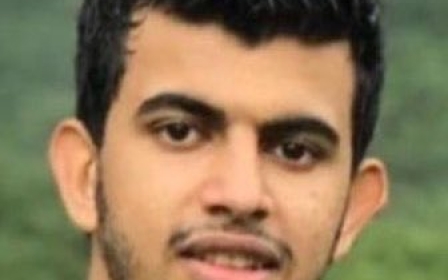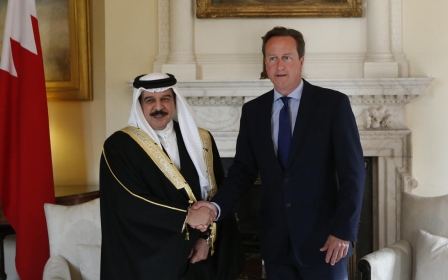Bahraini activist barred from Conservative conference on police advice
A prominent Bahraini activist was denied entry to this week's Conservative Party annual conference in Manchester after the intervention of British police.
Sayed Alwadaei, a London-based, international voice on Bahraini human rights, was told he had been refused a security pass to the event just days before he was due to speak on a panel about how the British government should stand up for individual rights around the world.
The charity that invited Alwadaei to the event in Manchester, Freedom From Torture, said it was told by the Conservative Party his exclusion was a “police matter”. It speculated that the decision had been made at the request of Bahrain.
A spokesperson for Greater Manchester Police confirmed Alwadaei’s accreditation had been refused but said it could not discuss the reason why. The Conservative Party did not respond to requests for comment.
The revelation will reignite questions about whether the UK’s close relationship with the Gulf state, which is accused of widespread suppression of its political dissidents, is compromising the UK’s own respect for human rights.
New MEE newsletter: Jerusalem Dispatch
Sign up to get the latest insights and analysis on Israel-Palestine, alongside Turkey Unpacked and other MEE newsletters
Alwadaei, the advocacy director of the Bahrain Institute for Rights and Democracy (BIRD), has no criminal record in the UK.
He was granted asylum in 2012 after being sentenced to six months in prison in Bahrain for his role in pro-democracy protests on the island which were violently quashed by the authorities in 2011.
He has twice been arrested in Britain for protests against the Bahraini government, but has never been charged. He said aside from these arrests he has never attracted the attention of the British authorities.
“I think this is not to do with my organisation, it’s likely to do with me personally,” he said.
Stripped of citizenship
Alwadaei was stripped of his Bahraini citizenship in 2015 after he protested at the Royal Windsor Horse Show against the Queen’s hosting of King Hamad bin Issa al-Khalifa.
In an opinion piece published by MEE at the time, Alwadaei accused the Conservatives, the UK's ruling party since 2010 and then led by David Cameron, of being too close to the Bahraini ruling family.
Three of his relatives have been in jail in Bahrain since 2017 on terrorism-related charges, with a UN watchdog in January saying that they had been detained as reprisal for Alwadaei’s activism.
More than 50 British MPs, senior lawyers and NGO directors in April signed a letter calling for the British government to condemn their detention.
Bahrain denies that the three were detained because of their family links to Alwadaei.
The UK has sought closer ties with once-British-ruled Bahrain despite the suppression of dissent on the island since 2011.
Last year, the Royal Navy opened a new base on the island, the UK's first permanent military facility in the Gulf since the British withdrawal when Bahrain declared independence in 1971.
Since 2016, the UK has also sold £54 million ($66m) in arms to the kingdom, part of the Saudi-led coalition currently fighting in Yemen, according to the Campaign Against Arms Trade.
Bahrain and other members of the coalition are currently subjects of a British ban on new licences for the sale of weapons which would be used in Yemen, because of concerns they may be used in breach of international humanitarian law.
Bahrain's Sunni ruling family is closely aligned with Saudi Arabia, which with other Gulf Cooperation Council states sent security forces to the island in 2011 to help quash demonstrations by mostly Shia Muslim protesters.
Alwadaei told MEE: “I was the victim of the Bahraini regime in which they have used collective punishment against my family. For them it has been to eliminate me from speaking out about things that are the direct consequences of Conservative policies.
"It’s very much upsetting to me as an advocate working with cross-party British parliamentarians to raise the issue of Bahrain.”
'The tentacles of the police state'
Sonya Sceats, the chief executive of Freedom From Torture, who spoke at the event to which Alwadaei was invited, said: “This appears to be the tentacles of the Bahraini police state reaching deep into Britain to stop a torture survivor and respected democracy activist from speaking out about repression in his country and how Britain can help stop it.”
She added: “We were shocked to learn Mr Alwadaei was blocked from attending on security grounds, just a few days before our event.”
Maya Foa, director of the campaign group Reprieve, which last year nominated Alwadaei for a human rights award, said: “Sayed Alwadaei’s fearless human rights activism has drawn attention to appalling abuses in Bahrain, at great personal cost to him and his family. It has also cast a spotlight on the UK government’s troubling relationship with the kingdom.
“Britain has provided millions of pounds in security assistance to a Bahraini regime that arrests its critics and tortures them into false confessions. Any further assistance must be dependent on respect for fundamental human rights, starting with an end to arbitrary detention, sham trials, and the use of the death penalty as a tool to suppress political dissent.”
The British foreign and home offices said Alwadaei’s exclusion from the Conservative conference was a matter for the party.
MEE contacted the Bahraini embassy in London for comment but had not heard back at the time of publication.
Alwadaei said BIRD had attended the Conservative Party conference in 2015, but he personally had not.
He was due to speak alongside, among others, former Conservative cabinet minister Dominic Grieve, now an independent MP, and journalist Peter Oborne, an MEE contributor.
The event was co-organised by Bright Blue, a centre-right thinktank with close ties to the Conservative Party. Its title was “An Authoritarian Turn: How can Britain best stand up for individual rights around the world?"
Sceats added: “It is fitting that this happened at an event where we were debating creeping authoritarianism in our own liberal democracy and the risk that, in a post-Brexit world, Britain will become more reluctant to speak out against torture by our allies and trading partners.”
Middle East Eye delivers independent and unrivalled coverage and analysis of the Middle East, North Africa and beyond. To learn more about republishing this content and the associated fees, please fill out this form. More about MEE can be found here.





